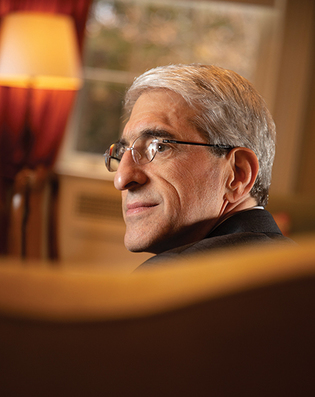
Mark Ostow
The Yale Alumni Magazine publishes a letter from President Peter Salovey ’86PhD in every issue. In this letter, the president discusses the renovation and transformation of the Hall of Graduate Studies into the Humanities Quadrangle.
View full image
Dear Friends,
This summer, Marta and I enjoyed walking through Yale’s beautiful campus in the early morning and evening. Over the past months, we have watched as construction crews and facilities teams skillfully tackled several building and renovation projects. By the time you read this, students, faculty, and staff will have returned for the fall semester, bringing life to classrooms, laboratories, offices, and residential colleges. No doubt they, too, will notice new aspects of our built environment—signs of the tremendous work that was accomplished in their absence. But although cranes and construction fences come and go, we are always advancing Yale’s enduring mission of education and research.
I was reminded of this—the continuity of Yale’s mission through the years—during a recent visit to the new Humanities Quadrangle at 320 York Street (known to many of us as the Hall of Graduate Studies). As I toured the offices, classrooms, and meeting spaces, I could picture countless students and scholars who had studied and taught there—and I imagined all that future generations will achieve in the new “HQ.” Many of the superb architectural details of the original structure, designed by James Gamble Rogers, Class of 1889, have been preserved and refurbished, but a top-to-bottom renovation and expansion have brought the building into the twenty-first century. Students and faculty members from 15 humanities departments across the Faculty of Arts and Sciences, as well as Directed Studies and the Whitney Humanities Center, are together under one roof. From desks in the Swensen Tower, looking out across New Haven, graduate students have space to think and write. In the Alice Cinema on the lower level, film events will bring people together for shared experiences. It is fitting that this historic space will provide an outstanding home for Yale’s great tradition of excellence in humanities to flourish in a new era.
Looking to the future while building on our traditions: you can see this approach across campus. For the first time this fall, Yalies will be able to enjoy the Schwarzman Center, a new hub for student life and the performing arts. At the heart of this magnificent space is Commons, where many alumni will remember eating meals and gathering with friends. For so many Yalies, Commons was an integral part of their introduction to this community and a place where lifelong friendships were forged. Now, current and future generations of Yale students will make their own enduring memories in Commons and throughout the Schwarzman Center.
We are witnessing a similar transformation from old to new on Science Hill. Last fall, the renovation of Kline Tower began. This 17-story structure, built in the 1960s, is being converted into a new home for the Departments of Astronomy, Mathematics, and Statistics and Data Science, and parts of the Department of Physics. These bold investments in the sciences—along with new structures like the Yale Science Building, which opened in 2019—will enable Yale to tackle some of the most urgent challenges facing humanity, from global warming and biodiversity loss to illness and disease.
Change, of course, is not limited to campus buildings. Last spring, we reimagined teaching and learning, residential life, and business operations at the university, all in a matter of weeks. We knew that many of these changes—perhaps the most significant outside of wartime in Yale’s history—would be temporary. And yet I was impressed that even in the midst of dramatic change, our students, faculty, and staff remained laser-focused on Yale’s mission. Their dedication helped us not only sustain but advance our commitment to life-enhancing research, education, and practice.
It is still too early to know for sure how the lessons of the COVID-19 pandemic will reshape work, relationships, civic life, and more going forward. I am certain, however, that Yale will embrace opportunities for change that allow us to accomplish our unchanging mission. The technology we use and the buildings we occupy may evolve, but our commitment to excellence does not waver. After all, for over 300 years, Yale has educated and prepared students to serve the world; we have created knowledge that benefits humanity. Knowing this, I hope you will join me in greeting a new academic year with optimism.
With my warmest wishes,
Peter Salovey ’86PhD
President
Chris Argyris Professor of Psychology
 loading
loading